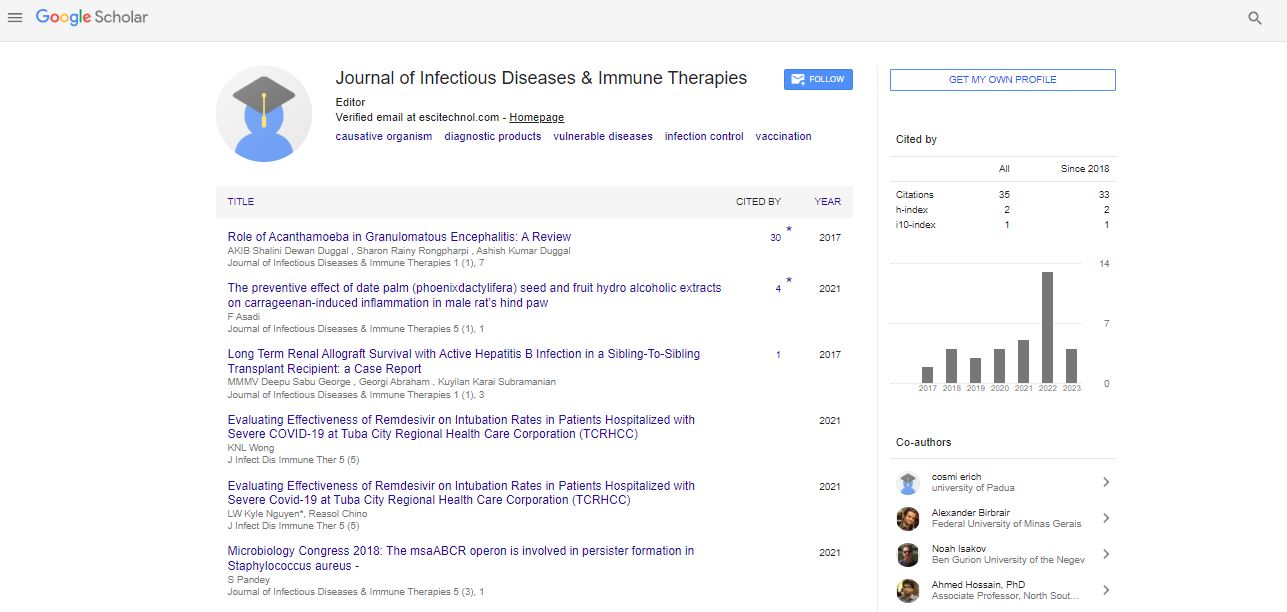Perspective, Vol: 12 Issue: 2
Immunopathogenesis: Unraveling the Complexity of Dysregulated Immune Responses
Guochun Hong*
Department of Nephrology, The Second Xiangya Hospital of Central South University, Changsha, China
*Corresponding Author: Guochun Hong
Department of Nephrology, the Second
Xiangya Hospital of Central South University, Changsha, China
E-mail: hongchunchen@csu.edu.cn
Received date: 27 May, 2023, Manuscript No. JIDITH-23-106354;
Editor assigned date: 29 May, 2023, Pre QC No. JIDITH-23-106354 (PQ);
Reviewed date: 15 June, 2023, QC No. JIDITH-23-106354;
Revised date: 23 June, 2023, Manuscript No. JIDITH-23-106354 (R);
Published date: 30 June, 2023, DOI: 10.4172/2329-9541.1000343
Citation: Hong G (2023) Immunopathogenesis: Unraveling the Complexity of Dysregulated Immune Responses. J Immunol Tech Infect Dis 12:2.
Description
Immunopathogenesis refers to the process by which aberrant immune responses contribute to the development and progression of various diseases. This explores the intricate mechanisms involved in immunopathogenesis, highlighting the dysregulation of immune responses and its impact on human health. We discuss key factors that influence immunopathogenesis, including genetic predisposition, environmental triggers, and the interplay between innate and adaptive immune systems. Additionally, we delve into the immunopathogenesis of several prominent diseases, including autoimmune disorders, infectious diseases, and cancer. By understanding the underlying immunological processes, we aim to pave the way for the development of targeted therapies and interventions to mitigate the detrimental effects of immunopathogenesis.
Immunopathogenesis encompasses a broad range of diseases, including autoimmune disorders, infectious diseases, and cancer, where immune dysregulation plays a pivotal role in disease onset and progression. This section provides an overview of immunopathogenesis, emphasizing the importance of understanding the complex interplay between the immune system and various pathological conditions. We highlight the significance of deciphering the underlying mechanisms to develop effective therapeutic strategies for mitigating immunopathological consequences.
Genetic factors influence individual susceptibility to immunopathogenesis. In this section, we explore the impact of genetic predisposition on immune dysregulation, focusing on key genes and pathways implicated in various diseases. We discuss the role of Human Leukocyte Antigens (HLAs) in autoimmune disorders, genetic polymorphisms in innate immune receptors, and the influence of immune-related genes on infectious disease outcomes. Understanding the genetic basis of immunopathogenesis can facilitate personalized medicine approaches and aid in the identification of potential therapeutic targets.
Environmental factors play a crucial role in triggering and exacerbating immunopathological conditions. This section investigates the impact of environmental triggers, such as infections, pollutants, dietary factors, and lifestyle choices, on immune dysregulation. We examine the complex interactions between environmental agents and the immune system, highlighting their contribution to the development of chronic inflammatory diseases, allergic reactions, and immune-mediated tissue damage. Strategies aimed at reducing exposure to these triggers can have significant implications for disease prevention and management.
The coordination between innate and adaptive immune responses is essential for effective immune surveillance and response. In this section, we delve into the intricate interplay between innate and adaptive immunity in immunopathogenesis. We discuss how dysregulated innate immune activation can lead to chronic inflammation and contribute to the pathogenesis of autoimmune disorders and infectious diseases. Furthermore, we explore how impaired adaptive immune responses can result in immune evasion by pathogens and ineffective tumor surveillance. Elucidating the crosstalk between these two arms of the immune system holds great potential for the development of novel therapeutic strategies.
Autoimmune disorders, infectious diseases, and cancer represent major areas where immunopathogenesis manifests. In this section, we provide an in-depth analysis of the immunopathogenic mechanisms underlying these diseases. We discuss the breakdown of immune tolerance and the emergence of autoimmunity in disorders such as rheumatoid arthritis, systemic lupus erythematosus, and multiple sclerosis. Additionally, we explore how immune dysregulation contributes to the pathogenesis of infectious diseases, including viral, bacterial, and parasitic infections. Finally, we examine the role of immune evasion, tumor-promoting inflammation, and impaired immune surveillance in cancer immunopathogenesis.
Developing effective therapeutic interventions is crucial in mitigating the adverse effects of immunopathogenesis. This section highlights current and emerging therapeutic approaches, including immunomodulatory drugs, targeted biologics, and immune checkpoint inhibitors. We discuss the challenges associated with immunopathogenesis directed therapies and explore potential strategies for personalized and precision medicine approaches. Furthermore, we emphasize the importance of interdisciplinary collaborations between clinicians, immunologists, and researchers to advance our understanding and management of immunopathological conditions.
The immunopathogenesis represents a complex interplay between dysre Regular Issuegulated immune responses and various disease states. By unraveling the underlying mechanisms, we can develop targeted therapeutic strategies and interventions to ameliorate the impact of immune dysregulation on human health. Continued research and collaboration are essential to advance our understanding of immunopathogenesis and pave the way for improved diagnostic, preventive, and therapeutic approaches to mitigate the detrimental consequences of immunopathological conditions.
 Spanish
Spanish  Chinese
Chinese  Russian
Russian  German
German  French
French  Japanese
Japanese  Portuguese
Portuguese  Hindi
Hindi 